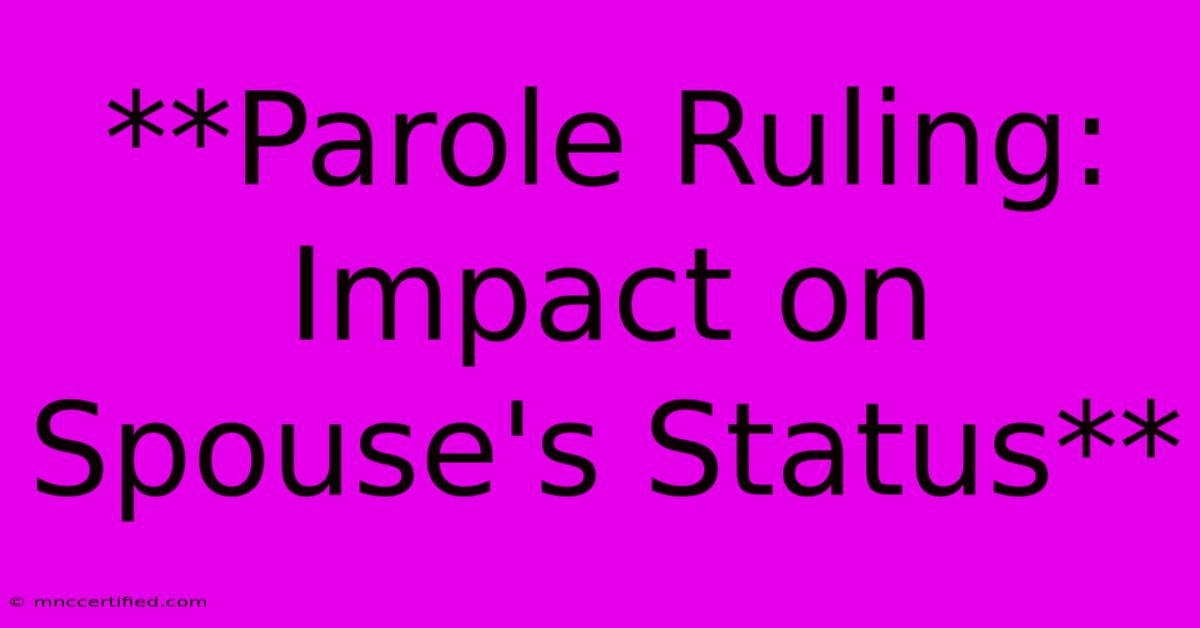**Parole Ruling: Impact On Spouse's Status**

Table of Contents
Parole Ruling: Impact on Spouse's Status
The recent parole ruling has generated significant discussion, particularly regarding its potential impact on the immigration status of spouses accompanying parolees. This article aims to shed light on the nuances of this complex issue, providing a comprehensive understanding of the current legal landscape.
Understanding Parole and its Implications
Parole, in the context of immigration, is a discretionary grant by the United States government allowing an individual to enter or remain in the country temporarily for humanitarian reasons or for significant public benefit. This temporary stay does not grant permanent residency or a pathway to citizenship.
While parole itself doesn't directly affect the spouse's immigration status, it can have indirect implications through several pathways:
1. Derivative Parole: This applies when a parolee's spouse applies for parole based on their relationship to the parolee. Derivative parole is granted on a case-by-case basis and is subject to the same criteria as the original parole granted to the primary applicant.
2. Family-Based Petitions: Parole status can impact the filing of family-based petitions. While parolees themselves can't adjust their status to a green card, their spouses can file for family-based petitions. This option is available if the parolee is eligible for a green card through a qualifying family member, like a U.S. citizen or permanent resident spouse.
3. Humanitarian Parole: In certain circumstances, spouses accompanying parolees may be eligible for humanitarian parole. This typically applies when the spouse faces extreme hardship or danger in their home country.
4. Deferred Action for Childhood Arrivals (DACA): While not directly related to parole, it's worth noting that spouses of DACA recipients can also file for family-based petitions.
5. Considerations for Parolees: It's crucial to remember that parole is a temporary status and doesn't guarantee permanent residency. Parolees must maintain their lawful status, comply with the terms of their parole, and avoid any activities that could jeopardize their status.
Navigating the Complexity of Parole and Spousal Status
Given the intricate nature of immigration law, seeking guidance from an experienced immigration attorney is strongly advised. An attorney can assess individual circumstances, evaluate eligibility for various pathways, and provide tailored advice on navigating the complexities of parole and its impact on spousal status.
Key Takeaways:
- Parole status itself does not automatically grant a spouse immigration status.
- Spouses of parolees may have several options for obtaining lawful status in the U.S., depending on individual circumstances.
- Seeking guidance from an immigration attorney is essential to understand the specific legal implications of parole on a spouse's status.
Remember: Immigration laws are constantly evolving, and the information provided here is for informational purposes only. Consult with a qualified immigration attorney for the most up-to-date guidance and specific advice tailored to your situation.

Thank you for visiting our website wich cover about **Parole Ruling: Impact On Spouse's Status**. We hope the information provided has been useful to you. Feel free to contact us if you have any questions or need further assistance. See you next time and dont miss to bookmark.
Featured Posts
-
Tennessee And Danny Share Baby News
Nov 09, 2024
-
Franklin Madison Insurance Phone Number
Nov 09, 2024
-
San Francisco Mayor Elect Luries Victory Speech Plans
Nov 09, 2024
-
Liverpool Hope For Zoes Place
Nov 09, 2024
-
Insurance That Covers Cosmetic Surgery
Nov 09, 2024